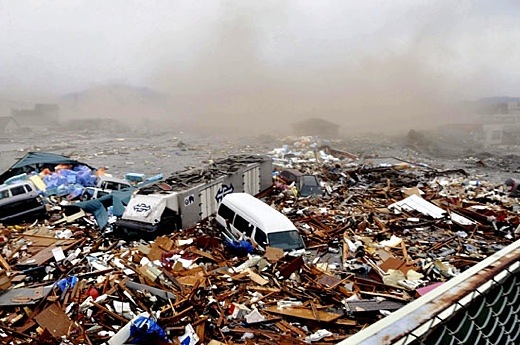 Image above: Cars and rubble piled up after tsunami in Japan. From (http://www.christianpost.com/news/quake-tsunami-devastate-japan-49376).
Image above: Cars and rubble piled up after tsunami in Japan. From (http://www.christianpost.com/news/quake-tsunami-devastate-japan-49376).
The full scale of the damage wrought on Japan's economy by the earthquake and tsunami is hard to gauge. But what is clear is that the disaster could not have come at a worst time for the government of Prime Minister Naoto Kan, who has inherited an ailing economy and just this week grappled with a political crisis. Reporter: Sen Lam Speaker: Richard Tanter, senior research associate, Nautilus Institute
LAM: Barely a week after losing his foreign minister, Seiji Maehara, to a political funding scandal, Prime Minister Naoto Kan has a bigger crisis on his hands. The powerful earthquake which rocked the country, buckling roads and sending a major steel plant ablaze, wrought havoc in Miyagi prefecture. A tsunami reportedly ten metres high, hit the port city of Sendai. Already, the Bank of Japan has pledged to do everything to ensure financial market stability, as Nikkei stock futures fell over three percent. Japan analyst, Richard Tanter, is senior research associate at the Nautilus Institute in Melbourne. Dr Tanter has been following news from Tokyo all afternoon. TANTER: I think it's actually unprecedented in a peace time economy in any of the advanced industrial countries. I just heard the prime minister of Japan and the chief cabinet secretary advising people in coastal areas of Japan to move to higher ground, wherever they can, and to not make the judgement themselves. That means that effectively, if we just look at the Pacific coast side of Japan, the population of most of Tokyo, on the plain, most of Osaka and many cities on that Pacific side, will be responding very quickly to try and move. That in itself, that mass evacuation will cause extraordinary chaos. But of course, almost all the important industrial assets of Japan are located on those two big plains around Tokyo and Osaka and point north and south of there. So to the extent that the tsunami and the earthquake effects are felt even more than a kilometre or so from the coast. There'll be huge damage to the Japanese economy. LAM: As you said, it's an unprecedented peacetime disaster. The yen's fallen, the Nikkei index fell over three percent. Is there likely to be an emergency budget? TANTER: Well, I think Japanese politics has already been in such flux that it's very hard to know what will be done. I'm sure there will be to a certain extent some bipartisanship, but how long it will prevail I don't know. Prime Minister Naoto Kan is dealing with it very effectively on television at the moment, which is important for calming people's fears. Certainly there will need to be urgent budgetary expenditures, how that will handled is not yet clear. LAM: The disaster could not have come at a worst time, with the government of Prime Minister Naoto Kan facing a political crisis. He lost his foreign minister barely five, six days ago, and now he's also struggling to revive an ailing economy. How do you think the government will cope? TANTER: Well, it is extremely hard to know. Really, people could be reacting in one of two ways. Either this is the disaster that breaks the camel's back, so to speak. Or it could, as actually did happen around the Kobe earthquake, reveal the resilience of the society and the economy and that's very much what we should be hoping for. But the economic effects, whatever the political context, they're going to be extraordinary. One example of that, is the question of the nuclear power stations which run all along that Pacific coast, particularly north from Tokyo, through Sendai, through Miyagi prefecture itself, going further north, right up to Almori on the tip of Honshu. There are very important nuclear power stations. The government has reported that as designed, they are closing down automatically, but the economic effects can be gauged by from happened the last time there was a major earthquake in Japan, in September 2007, on the other side, the Japan Sea side, which closed down the largest nuclear power plant in Japan for more than year and a half. And so, Japan is highly dependent on these nuclear power stations. They may well have closed automatically and hopefully, there's no radiation problem, but the economic consequences of them closing, and we don't really know the damage yet, but from the 2007 example, these could be out of action for a very long time. And for the world's second, third largest industrial economy, that's an extraordinary prospect to face. LAM: And so they're facing a potentially huge energy crisis? TANTER: They are indeed and this is at a time when the economy was just beginning to stutter and go a little better than had been. In fact Japan outperformed most G7 countries recently, but this has put an end to that. LAM: Japan specialist Richard Tanter of the Nautilus Institute in Melbourne. And as Richard says whether or not an energy crisis is imminent for Japan remains to be seen. But certainly the prognosis doesn't look good. The Hokuriku Electric company reported that it's closed all three reactors at its Onagawa plant. The JX Nippon Oil and Energy Corporation, Japan's top refinery, is also reported to have halted operations at three of its giant plants in Sendai, Kashima and Negishi. Early Japanese paintings and woodblocks have shown us that tsunamis have been hitting Japan for hundreds of years. But the descendants of the Ukiyo-e school are now hoping this latest tsunami won't knock the country back into the last century.
Video above: Scenes of Japan tsunami inundation provided by Al Jazeera. From (http://www.youtube.com/watch?v=80CH_XkpSCE).
.
No comments :
Post a Comment